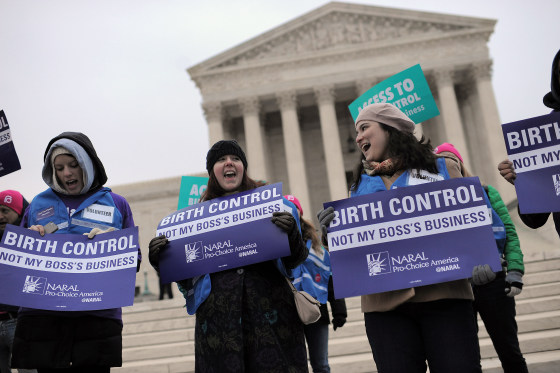
The ruling greatly expands the kinds of employers that can cite religious or moral objections in declining to include birth control in their health care plans.

From left, Alena Yarmosky, Taylor Brannan, and Caroline O'Shea take part in a demonstration outside the Supreme Court of the United States on a day that the court hears arguments on aspects of the Affordable Care Act involving a mandate for contraception on March 25, 2014 in Washington, DC. Matt McClain / The Washington Post via Getty Images file
July 8, 2020, 2:14 PM UTC / Updated July 9, 2020, 3:31 AM UTCWASHINGTON — The U.S. Supreme Court on Wednesday cleared the way for the Trump administration to give the nation's employers more leeway in refusing to provide free birth control for their workers under the Affordable Care Act.
The ruling is a victory for the administration's plan to greatly expand the kinds of employers who can cite religious or moral objections in declining to include contraceptives in their health care plans.
Up to 126,000 women nationwide would lose birth control coverage under President Donald Trump's plan, the government estimated. Planned Parenthood said nearly nine in 10 women seek contraceptive care of some kind during their lifetimes.
The Affordable Care Act, better known as Obamacare, gives the government authority to create the religious and moral objections, said Justice Clarence Thomas for the court's 7-2 majority.
The Department of Health and Human Services "has virtually unbridled discretion to decide what counts as preventive care and screenings," and that same authority "leaves its discretion equally unchecked in other areas, including the ability to identify and create exemptions from its own guidelines," he said.
HHS Secretary Alex Azar said in a statement, "It is a shame that nuns ever had to go to the Supreme Court to ensure they can care for the elderly poor without violating their consciences, but thanks to their courageous advocacy and the leadership of President Trump, they — and all Americans of faith — have now triumphed."
In their dissenting opinion, Justices Ruth Bader Ginsburg and Sonia Sotomayor said the court in the past has struck a balance in religious freedom cases, so that the beliefs of some do not overwhelm the rights of others.
"Today for the first time, the court casts totally aside countervailing rights and interests in its zeal to secure religious rights to the nth degree" and "leaves women workers to fend for themselves" in seeking contraceptive services, they said.
Women’s groups condemned the ruling. The National Women’s Law Center said more than 61 million women get birth control coverage through Obamacare.
“The Supreme Court’s decision will leave their ability to receive this critical coverage at the whim of their employers and universities," the group said. "This decision will disproportionately harm low-wage workers, people of color, LGBTQ people, and others who already face barriers to care.”
Former Vice President Joe Biden, the presumptive Democratic presidential candidate, said Wednesday night that, "Health care is a right that should not be dependent on race, gender, income or zip code. Yet as a result of today's decision, countless women are at risk of losing access to affordable, preventive care."
"As disappointing as the Supreme Court's ruling is, there is a clear path to fixing it: electing a new President who will end Donald Trump's ceaseless attempts to gut every aspect of the Affordable Care Act," he said in a statement.
In addition, the court announced that Thursday is the last day of the term. It is expected that rulings on two cases involving Trump — the Manhattan district attorney's effort to get years' worth of his tax returns as part of a probe into hush-money payments to two women and the House Democrats' bid to obtain financial records from the Trump Organization's accounting firm and two banks — will be released on Thursday.
Since Congress passed Obamacare in 2010, the issue of which employers can decline offer contraceptive coverage has remained highly controversial.
Houses of worship and their auxiliaries were originally given an exemption, and a later rule allowed some non-profit religiously affiliated employers an accommodation: They could opt out of directly providing the coverage as long as they gave notice of their objection. Their insurer or the government would then pick up the cost of the coverage.
In a 2014 case involving the Hobby Lobby stores, the Supreme Court said a private, religiously oriented, and closely held company could get an exemption from the contraceptive mandate on religious grounds.
Wednesday's decision involved Trump administration rules that would allow publicly traded companies and large universities to claim a religious objection for refusing to provide the coverage. Even more broadly, employers and schools with any moral objection would also be exempt from the requirement.
The rules were intended to deliver on a campaign promise by Trump to roll back the coverage requirement. He said employers should not be "bullied by the federal government because of their religious beliefs."
New Jersey and Pennsylvania sued, saying they would have to pick up most of the cost of contraceptive coverage, and a federal appeals court last year blocked enforcement of the rule nationwide. The Trump administration and the Little Sisters of the Poor, an order of Catholic nuns who have consistently fought the contraceptive insurance requirement, defended the proposed rule.
Pete Williams is an NBC News correspondent who covers the Justice Department and the Supreme Court, based in Washington.